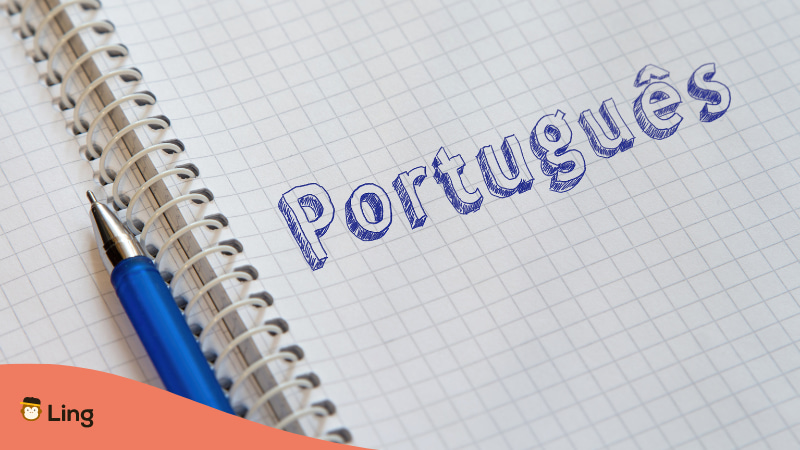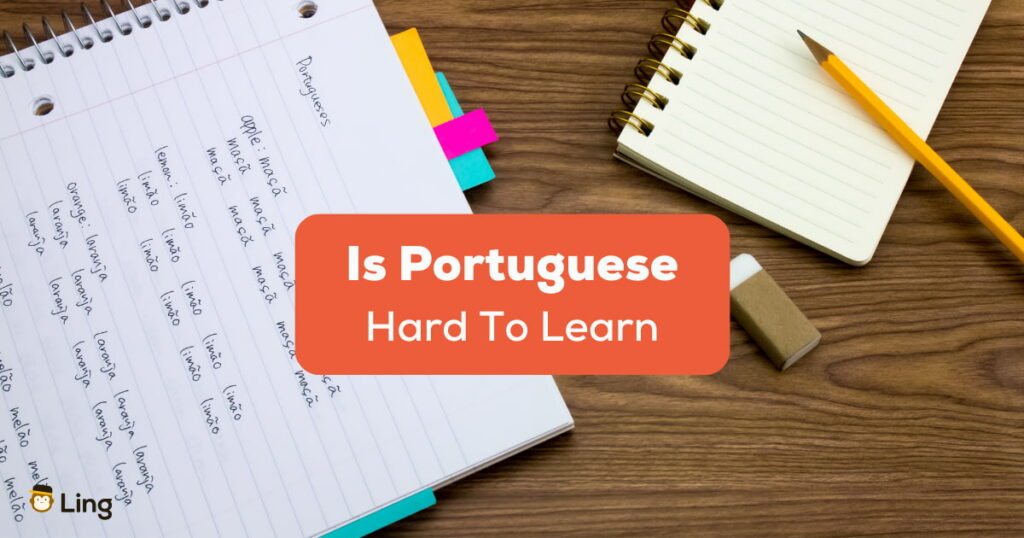Is Portuguese hard to learn, or is it worth trying? If you are wondering if the Portuguese language learning journey will be complex, stay assured that this is not the case.
Around 200 million people speak Portuguese. It is the sixth most spoken language in the world, ahead of German, French and Italian. In addition, there are many Portuguese-speaking countries.
Specifically, it is the official and native language of eight countries, spoken in Europe (Portugal and the Portuguese islands), Africa (Angola, Mozambique, Guinea-Bissau, São Tomé and Príncipe, Cabo Verde), Asia (East Timor, Macao, Goa) and, of course, in South America (Brazil).
This article details why the Portuguese language is easy and worth learning.
Is Portuguese Hard To Learn? Reasons Why It’s Actually Easy
Is Portuguese hard to learn or is it a myth? Portuguese is a relatively easy language to learn. Here is why:
- If you already know a little Spanish or speak Spanish, it will be even more accessible since a certain number of words are almost identical.
- Along with French, English, and Spanish, Portuguese belongs to the Romance language family, so if you already speak one of these languages, you will be able to understand its patterns in no time, thanks to many similarities.
- As for grammar, however, this language organizes sentences in the same order as the English language (noun – verb – complement).
- Many people wonder if they should learn Portuguese or Brazilian Portuguese since the pronunciation is very different. For example, the native speakers of Brazil usually pronounce all the vowels and all the syllables, which the Portuguese do not.
Therefore, it will be easier for beginners to understand the Brazilian accent.

What Are The Most Challenging Aspects Of Learning Portuguese?
Learning Portuguese has some challenging aspects, but it is true of any language. Here are some of the elements that learners might find difficult in the Portuguese language:
- Different pronunciations: native speakers have different accents based on the region or country. The pronunciation might vary from European Portuguese to Brazilian Portuguese, etc.
- Names in the Portuguese language have a gender, so you have to know how to make the feminine or the masculine form.
- The subjunctive mode in the Portuguese language can create confusion for new learners. (This is a speaking form that expresses uncertainties).

How Can I Learn Portuguese Faster?
If you wish to learn Portuguese quickly and effectively, you can employ some methods to make it easier and faster.
Here are some valuable tips for learning Portuguese faster:
Use a Portuguese Grammar Book
The first step in learning a new language is to get a good grammar book for beginners. It’s a resource you’ll return to repeatedly because you can’t absorb all the grammar rules in one fell swoop. It will be your main point of reference.
Learn The Main Peculiarities Of Portuguese
There are many things to discover when learning Portuguese that make it a fascinating language. There are exciting uses of infinity, for example, that we do not find in other languages.
All these peculiarities are explained in detail in a good grammar text, but you could also find something online.
Learn Whole Sentences
To go faster in your learning, try to learn complete sentences that will help you stand out in conversations. Start learning simple phrases such as your name, where you come from, etc.
Be Regular
Regularity is essential if you want to progress. It is assumed that your idea is not just to learn a sentence and a few words but the hope of be able to speak Portuguese fluently. So, to integrate these vocabulary phrases and words into long-term memory, it is essential to learn them and then review them regularly.
Learn From Exciting Sources
Once you have begun to become familiar with the Portuguese language, you can begin to combine business with pleasure. For example, you can start listening to Portuguese or Brazilian songs and try to find the written text to translate it.
Brazilian music is rich and enjoys a great diversity: samba, bossa nova, sertaneja music, jazz, rock, carioca funk, etc. There is something for everyone, and studying will become more enjoyable.
Furthermore, you could start watching movies and TV series in Portuguese, first helping you with the subtitles in Italian and then with the subtitles in the language: it will refine your understanding and pronunciation.

What Are The Advantages Of Learning Portuguese?
If you wish to learn Portuguese, you should know that there are unique advantages.
1. Join Millions Of People
Portugal may be a relatively small country, but its language has traveled far and wide. So much so that Portugal is not even the main seat of the Portuguese language in the world; more than 207 million people live in Brazil, and the vast majority are Portuguese speakers.
2. Stand Out From The Crowd
However, an increasing percentage of English speakers choose to learn a foreign language and only a few pick Portuguese. With a good grasp of this language, you will have a unique skill set that will set you apart from the crowd.
3. It’s a Great Reason To Move To Portugal (Or Brazil)
Once you know the language, moving to Portugal or Brazil is are great option to consider. Finding a job and integrating into the local community is much easier when you can speak seamlessly with anyone around you.
Spend a couple of years on Portugal’s beautiful Algarve coast, with the cool Atlantic Ocean and endless surfing opportunities, or fly to Brazil to enjoy the vitality of local culture.
4. It Is Relatively Simple To Learn
Learning a language takes some effort, but Portuguese is relatively simple. You don’t have to learn a new alphabet, such as you should do with Russian, Japanese, or Arabic. Portuguese shares many of its words with Spanish and enjoys a syntactic structure similar to English.

5. It Is The Gateway To a Third (And Fourth!) Language
It also works in reverse: learning Portuguese as a second language will make it even easier for you to learn other Romance languages; then continue with Spanish, French, or even Romanian, and you will find that learning additional languages deriving from Latin will be easy for you.
6. It Is One Of The Most Widely Spoken Languages Online
Portuguese is the 5th most-used language online, as Portuguese pages and users are increasing rapidly.
7. Brazil Is a Nascent Power
Since the early 1990s, Brazil has increasingly emerged as a power in the making. Although the situation has slowed down in recent years, international companies continue to establish offices in Brazil, so knowing Portuguese is becoming an increasingly popular skill.
8. To Make New Friends
Learning a language abroad is an immersive experience, so it’s a quick way to create a fantastic group of many new friends. Your classmates and roommates – as well as any local people you meet during your stay – will become your family when you start your journey in a new city.
Would you like to learn Portuguese?
Learn Portuguese Using Ling App
If you wish to learn Portuguese fluently, you can use a simple and powerful tool, the Ling app!
With this tool, you can learn Portuguese pronunciation well to sound like a native speaker; you can learn Portuguese verb conjugations and increase your vocabulary. Moreover, if you wish to speak other languages fluently, you can choose between the 60+ options available on this platform.
In addition, you can find more helpful information about the Portuguese language and culture in these valuable articles: Best Portuguese Slang Words To Sound Like A Local and Delicious Portuguese Food To Try Out Today!
Are you ready to try it out? Download the app for free on the Play Store and the Apple Store today!










